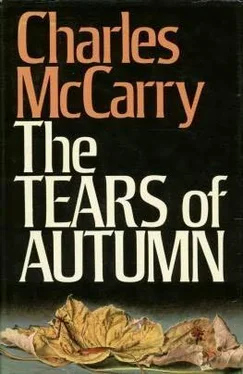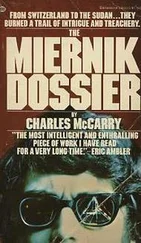“One night, Dieter was shooting some agents’ reports and one of their colonels came in, working late. He turned on the lights, and here was this sooty midget with a camera and an infrared light set up in his office and the safe spilling all over the floor. Dieter whipped out his gun and shot the Russian right between the eyes. He dropped everything but the camera and went up the chimney like a rocket.
“I’m waiting in the next street. Lights go on, sirens go off, soldiers start coming out the windows. Dieter spent twenty-four hours hanging on to his rope inside the chimney-they couldn’t find him, he couldn’t come down. Next night, he sneaked over the roof and got away. Still had the camera, but he forgot his rope and they found it, so that ended that. He wouldn’t have forgotten the rope, but all he could think about was taking a leak. The human element.”
“How’s he like the watch business?” Christopher asked.
“Okay, I guess. It pays for the girls. He takes pictures of them-he’s a white-socks fetishist. Tell him you’re a friend of Major Johnson. Old Dieter Dimpel. If you want to use a recognition code, give him the number of his party card, and Hitler’s -555. He’ll reply with the date of his arrest, June 4, 1943.”
Hitchcock listened happily to Christopher’s laughter. “I mean it,” he said, “look Dieter up. He’s useful.” Telling the story had made him feel better; despite all he had had to drink, he was alert and smiling.
He drove Christopher to the airport. They shook hands in the dark interior of the car. “I’d go in with you for a farewell drink, but Theresa worries at night,” Hitchcock said. “Christ how they change-had you noticed that, Paul?”
November is a rainy month on the Congolese coast, and Christopher was soaked when he entered the airport building after struggling through the crowd of porters between the curb and the entrance. In the ticket line an Englishman was having a violent argument with the airlines clerk, a laughing Congolese who told him that he had no record of his reservation.
“You’ll bloody well hear about this!” the Englishman said. “I’m a first-class passenger to London, and the booking was made a month ago.”
The Congolese waved his hand in the Englishman’s face. “Go away, go away-you have no reservation.”
Christopher slid his bag onto the scale and handed the clerk his ticket. The clerk removed the five-hundred-franc note from the ticket, put it in his breast pocket with the rest of his bribes, stamped Christopher’s boarding pass, and tagged his baggage.
“How much delay in the flight?” Christopher asked.
“That airplane will never be late!” said the clerk with another laugh.
Christopher took his passport out of his pocket, marked the page on which his visa was stamped with his boarding pass, and walked toward the passport control. A young Belgian priest carrying a transistor radio stepped in front of him. He tapped Christopher’s green passport with his finger.
“You’re an American?”
“Yes, Father.”
“Your President has been shot.”
“What?”
“President Kennedy-he’s dead. Listen.”
He turned up his radio. A Frenchman’s voice on Radio Léopoldville was reading the news from Dallas. It was nine o’clock in the Congo, two o’clock in Dallas. The news was still a simple bulletin.
Christopher went back to the ticket counter and lifted the clerk’s telephone. He dialed the American embassy. The duty officer did not say hello. He picked up the phone and said, “Yes, it’s true. President Kennedy has been assassinated. The vice-president is safe. The President is dead. We have no details. Please hang up now.” Christopher hung up the phone, nodded to the startled clerk, and walked toward the passport control.
Christopher never forgot anything. The tone of his mother’s voice, the smell of a leper in Addis Ababa, the telephone number of the embassy in Kabul, the looks of a man killed by a car in Berlin as he crossed the street to meet him moved constantly through his mind. Now he thought of nothing. He went to the windows and looked out through the rain at the glistening jets drawn up on the tarmac. He felt a hand on his arm; the priest was beside him again.
“There’s nothing more on the radio,” the priest said. “They’re playing music. Do you go to Brussels?”
“No, Rome.”
“You’re crying. Would you like to pray with me?”
“No, Father. I don’t believe.”
“It’s a frightful thing.”
Christopher thought the priest was talking about his rejection of faith. “For some,” he said.
“For all. President Kennedy was a great man. That death should come like that to him-he was like a young prince.”
“Yes, it’s a great shock.”
“You must have loved your President.”
“I love my country,” Christopher said.
“It’s the same thing, perhaps.”
“Ten minutes ago I wouldn’t have said so, Father. Now I think you’re right.”
It was dawn when Christopher arrived in Rome. He bought the newspapers and read them in the deserted waiting room at Fiumicino while he waited for his call to Paris to go through. Sybille answered the Websters’ phone.
“Tom’s at the embassy,” she said. “They’ve been up all night. We all have.”
“Tell him I’m home if he wants me.”
“I will. God, Paul, how I’m feeling this!”
“Yes,” Christopher said. “The next time you see your friend Peggy, ask her what she thinks of assassination now.”
Christopher saw the truth at dawn on the tenth day after the death of Kennedy. He woke shivering with cold and covered Molly with the blankets that had slipped to the floor during the night. A rooster crowed on the hillside above Siena, and as he watched from the open window of their hotel room, the town changed color in the growing light from burnt umber to rose.
In the first sunlight, two figures in black hurried across a field and into the edge of a woods. These Italian farnners going innocently to work triggered Christopher’s memory. Once again he saw men in black moving at a trot along the fringe of a forest, and an American in a flowered shirt lying in the weak morning light with the back of his head blown away.
The explanation struck like a bell in Christopher’s mind. He knew who had arranged the death of the President.
All his life, Christopher’s unconscious had released images, and he had learned to trust this trick of his mind. He often knew what men had done before they confessed their acts to him. (Cathy had thought him a fortune-teller. He had sometimes been able to see her lovers in her gestures-she would untie a scarf and pull the silk through her fist with a smile and Christopher would see her lifting her breast toward a stranger’s lips. “Did you see me, did you see me?” she would gasp. It excited Cathy to know she could walk through the gates of Christopher’s mind. She believed in dark powers.)
Christopher knew that this gift, which grew stronger as he grew older, was only a kind of logic. His senses received everything, he forgot nothing. Experience and information joined in the brain to provide explanations. It was like writing the first draft of a poem: words formed on the page without passing through the conscious mind.
Now, as he stood by the open window, he heard the plans being made for Kennedy’s murder. He saw the messages being passed, saw the look in the eyes of the conspirators, watched the tension flow out of their faces when news of success was brought to them. He felt their sense of triumph like an electrical charge between them. He himself had been a part of such scenes often enough. He wondered why it had taken him so long to realize the truth.
Читать дальше












